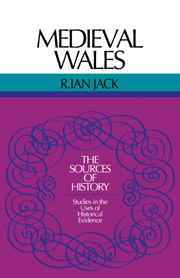Book contents
- Frontmatter
- Contents
- Abbreviations
- General Editor's Introduction
- Preface
- 1 Literary Sources
- 2 The Official Records of Wales and Their Preservation
- 3 The Records of the English Government
- 4 Archives of Individuals and Corporations
- 5 Ecclesiastical Records
- 6 The Antiquaries
- 7 Archaeology and Numismatics
- 8 Cartography and Place-Names
- 9 Conclusion
- Index
- Frontmatter
- Contents
- Abbreviations
- General Editor's Introduction
- Preface
- 1 Literary Sources
- 2 The Official Records of Wales and Their Preservation
- 3 The Records of the English Government
- 4 Archives of Individuals and Corporations
- 5 Ecclesiastical Records
- 6 The Antiquaries
- 7 Archaeology and Numismatics
- 8 Cartography and Place-Names
- 9 Conclusion
- Index
Summary
The English antiquarian tradition has attracted modern scholars, partly because of the intrinsic worth of the characters concerned, partly because of their place in intellectual history, partly because medievalists (who must use their collections) have developed a proper curiosity. Scholars with interests as diverse as Professor Piggott, Sir Thomas Kendrick, Professor Douglas and Miss McKisack have all found in the antiquaries subjects of absorbing interest and historical value. To study antiquaries is no longer antiquarianism. But, although this is abundantly true of England, Wales lags behind.
Welsh scholars of history, language and literature all use the work of the antiquaries extensively, yet there are no general surveys and few biographical studies. When in 1963 the Board of Celtic Studies prepared a survey of these studies in Wales, it chose the five heads of archaeology, history, the laws, literature and language. There was no sixth category drawing attention to the collectors and antiquaries whose zeal in preservation and transcription made possible modern Celtic studies. Moreover, Professor Dodd took a very limited view of his brief: ‘To write of Welsh historiography in the present century is virtually to cover the whole subject, for it is only here that the serious writing of Welsh history begins.’ Only Sir John Price (the sixteenth-century defender of Geoffrey of Monmouth) and David Powel gained a mention and there was no attempt at evaluation of anything but their ‘propagandist’ printed work.
- Type
- Chapter
- Information
- Medieval Wales , pp. 161 - 184Publisher: Cambridge University PressPrint publication year: 1976



